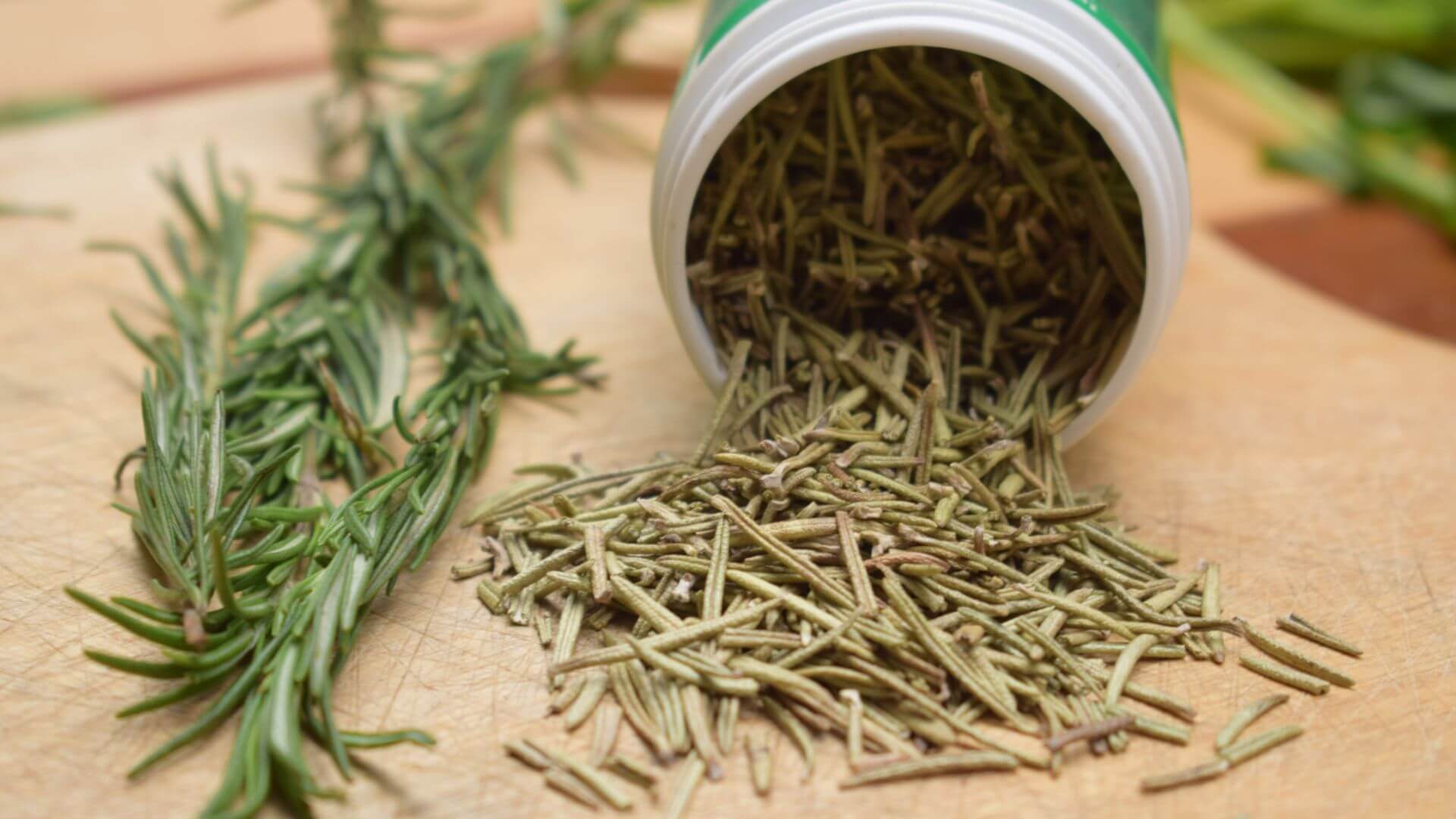Home>Types of Gardening>Edible Gardening>How Much Is Too Much Rosemary


Edible Gardening
How Much Is Too Much Rosemary
Published: January 30, 2024
Discover the ideal amount of rosemary for your edible garden. Learn how to cultivate and care for this aromatic herb. Get expert tips for successful edible gardening.
(Many of the links in this article redirect to a specific reviewed product. Your purchase of these products through affiliate links helps to generate commission for Chicagolandgardening.com, at no extra cost. Learn more)
Table of Contents
Introduction
Rosemary is a fragrant and flavorful herb that has been cherished for centuries for its culinary, medicinal, and ornamental properties. This woody perennial plant, scientifically known as Rosmarinus officinalis, is native to the Mediterranean region and is a beloved staple in many kitchen gardens. Its aromatic leaves not only add a delightful taste to various dishes but also offer a myriad of health benefits. However, like many good things in life, moderation is key. In this article, we will explore the captivating world of rosemary, uncovering its potential health benefits, the risks associated with excessive consumption, and the recommended daily intake. Whether you are a seasoned gardener, a culinary enthusiast, or someone interested in harnessing the power of nature for wellness, this article will provide valuable insights into the fascinating realm of rosemary.
As we delve into the multifaceted aspects of rosemary, we will journey through its historical significance, delve into its chemical composition and nutritional value, and explore the potential risks of overindulgence. Furthermore, we will discuss the recommended daily intake of rosemary to help you savor its goodness while maintaining a balanced approach to its consumption. Join us as we embark on a sensory and enlightening exploration of rosemary, from its luscious aroma and culinary allure to its potential impact on well-being.
Health Benefits of Rosemary
Rosemary is not only a delightful addition to culinary creations but also a treasure trove of health-enhancing properties. Its leaves are rich in essential oils, antioxidants, and other beneficial compounds that contribute to its array of potential health benefits. Let’s explore some of the remarkable ways in which rosemary can positively impact well-being:
- Antioxidant Powerhouse: Rosemary contains potent antioxidants, such as carnosic acid and rosmarinic acid, which help combat oxidative stress and protect the body from free radical damage. These antioxidants may contribute to overall health and well-being by supporting the body’s natural defense mechanisms.
- Anti-Inflammatory Properties: The anti-inflammatory effects of rosemary are attributed to its active compounds, which may help alleviate inflammation in the body. This makes rosemary a valuable ally in promoting joint health and addressing inflammatory conditions.
- Cognitive Support: Rosemary has been associated with potential cognitive benefits, including improved memory and concentration. The aroma of rosemary may have a positive impact on cognitive function, making it a popular choice for aromatherapy and mental clarity.
- Digestive Aid: Incorporating rosemary into meals can offer digestive support, as it may help alleviate indigestion and bloating. Additionally, rosemary’s carminative properties may assist in easing gastrointestinal discomfort.
- Immune System Support: The immune-boosting potential of rosemary is linked to its array of beneficial compounds. Regular consumption of rosemary may contribute to a strengthened immune response, helping the body ward off common illnesses.
These are just a few examples of the diverse health benefits that rosemary has to offer. From its potential to promote overall wellness to its role in enhancing culinary experiences, rosemary stands as a versatile herb with much to offer in the realm of health and vitality.
Potential Risks of Consuming Too Much Rosemary
While rosemary boasts an impressive array of health benefits, it’s important to be mindful of the potential risks associated with excessive consumption. Despite its culinary and medicinal appeal, consuming too much rosemary may lead to certain adverse effects. It’s essential to understand these potential risks to ensure a balanced approach to incorporating rosemary into your lifestyle. Here are some considerations to keep in mind:
- Excessive Essential Oils: Rosemary contains potent essential oils, and consuming large quantities of these oils, whether in culinary dishes or as a supplement, can lead to digestive discomfort and may even be toxic in extreme cases. It’s crucial to use rosemary in moderation to avoid overwhelming the body with concentrated compounds.
- Impact on Blood Pressure: Some studies suggest that high doses of rosemary may affect blood pressure levels. Individuals with existing blood pressure concerns should be cautious about consuming excessive amounts of rosemary, as it may interfere with their condition.
- Potential Allergic Reactions: While relatively rare, allergic reactions to rosemary can occur in some individuals. Symptoms may include skin irritation, respiratory issues, or digestive disturbances. Those with known allergies to plants in the Lamiaceae family (which includes mint, basil, and oregano) should exercise caution when consuming rosemary.
- Interactions with Medications: Certain compounds in rosemary may interact with medications or exacerbate underlying health conditions. If you are taking medications or have specific health concerns, it’s advisable to consult with a healthcare professional before significantly increasing your intake of rosemary.
By being aware of these potential risks, individuals can make informed choices about their consumption of rosemary and take proactive measures to ensure its integration into their diet aligns with their overall well-being. Moderation and mindfulness are key when harnessing the benefits of this beloved herb.
Recommended Daily Intake of Rosemary
When it comes to enjoying the benefits of rosemary while avoiding potential risks, understanding the recommended daily intake is essential. While there is no one-size-fits-all approach, general guidelines can help individuals incorporate rosemary into their daily routine in a balanced and mindful manner. Here are some considerations for determining a suitable daily intake of rosemary:
- Culinary Usage: For culinary purposes, incorporating fresh or dried rosemary into dishes in moderate amounts can add flavor and potential health benefits without overwhelming the system with concentrated compounds. A sprinkle of dried rosemary or a few fresh sprigs can impart its aromatic essence to a variety of recipes.
- Herbal Preparations: When using rosemary in herbal preparations, such as teas, tinctures, or extracts, it’s important to follow recommended dosage guidelines provided by reputable sources. Herbal preparations can deliver concentrated doses of rosemary’s active compounds, so it’s crucial to adhere to suggested usage instructions to avoid overconsumption.
- Supplements: If considering rosemary supplements, it’s advisable to consult with a healthcare professional to determine appropriate dosage based on individual health factors and potential interactions with medications. Responsible use of supplements involves understanding the quality, dosage, and necessity of incorporating them into one’s wellness regimen.
Ultimately, the recommended daily intake of rosemary varies based on individual factors such as age, overall health, and existing medical conditions. It’s important to approach the incorporation of rosemary into one’s diet with mindfulness and moderation, ensuring that its delightful flavor and potential health benefits are enjoyed without compromising well-being.
Conclusion
Rosemary, with its rich history, tantalizing aroma, and multifaceted benefits, holds a revered place in the realm of edible gardening and holistic wellness. From its culinary versatility to its potential to promote health and vitality, this beloved herb offers a tapestry of sensory delights and potential advantages. However, as with any botanical treasure, understanding the balance between its benefits and potential risks is crucial in harnessing its goodness responsibly.
By exploring the health benefits of rosemary, we’ve uncovered its remarkable array of properties, from its antioxidant prowess to its potential cognitive support and digestive aid. These attributes make rosemary a valuable addition to culinary creations and a potential ally in promoting overall well-being.
Conversely, it’s essential to be mindful of the potential risks of consuming too much rosemary, such as the impact of excessive essential oils, potential effects on blood pressure, and the rare possibility of allergic reactions. Understanding these considerations empowers individuals to approach the integration of rosemary into their lives with informed decision-making and prudent usage.
When considering the recommended daily intake of rosemary, the key lies in embracing moderation and mindfulness. Whether used in culinary endeavors, herbal preparations, or supplements, a balanced approach ensures that the delightful essence and potential benefits of rosemary are savored without compromising individual well-being.
In essence, the world of rosemary beckons with its aromatic allure and promises of culinary delight and potential wellness support. By honoring its heritage and harnessing its bounty with respect and understanding, individuals can savor the multifaceted gifts of rosemary while nurturing a harmonious relationship with this cherished herb.
As we continue to explore the wonders of edible gardening and the art of holistic well-being, may the journey with rosemary inspire a deeper connection to the bountiful offerings of nature and the wisdom of mindful consumption.








